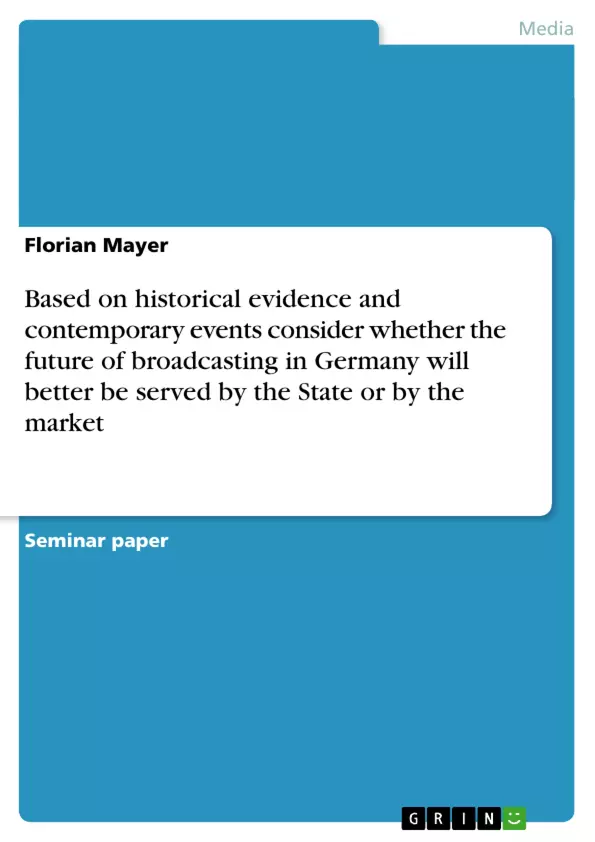At the beginning of the new century, with the ever greater interconnectedness of people through communication technology and the shift from material resources to information as indicator of the wealth of a nation, the common cultural policy debate about the control and financing of broadcasting continues on a broad level. Fuelled by the mediated attacks on the United States on September 11th the debate about whether there should be public service broadcasting and a licence fee or whether broadcasting would be better served by the market alone, fills pages in newspapers again (e.g. the three-days special in the G2 section of The Guardian about the state of British television, 19., 20. and 21.11.2001). Common accusations public television faces are that it allows itself to become increasingly commercialised and that it converges with the choice of programmes of private companies, thus violating its own programme commitments. In the following the German media landscape will be looked at to find out how broadcasting is being served in this European country and if the system ′in some respects really has model features′.
Inhaltsverzeichnis (Table of Contents)
- The German Media Landscape
- The Development of Private Commercial Broadcasting in Germany
- State Broadcasting Committees (Landesmedienanstalten)
- Public Service Obligations
- The Public Broadcaster ZDF and ARD
- Internal Organisation of the Public Stations
- A Historical Overview of Broadcasting in Germany
- Broadcasting During the Weimar Republic
- Broadcasting During the Third Reich
- The Post-War Broadcasting System
- The Debate about the Future of Broadcasting
- The Commercial Broadcasting Lobby (VPRT)
- Empirical Media Research
- The Role of Public Broadcasting in a Democractic Society
- The Importance of Public Broadcasting
- Experimental Programmes
- Globalisation of Entertainment
- Concentration of Ownership
Zielsetzung und Themenschwerpunkte (Objectives and Key Themes)
This text examines the development and current state of broadcasting in Germany, specifically exploring the ongoing debate about the role of public service broadcasting versus market forces in shaping the future of the industry. The analysis draws upon historical evidence and contemporary events to determine which model, state control or market forces, is better suited to serve the needs of German broadcasting.
- The evolution of broadcasting in Germany, from the pre-war era to the contemporary landscape.
- The historical and contemporary roles of public and private broadcasters.
- The challenges and opportunities facing broadcasting in Germany, including the impact of globalization and technological advancements.
- The influence of political, social, and economic factors on broadcasting policy.
- The potential implications of different regulatory models on the diversity, quality, and accessibility of broadcast content.
Zusammenfassung der Kapitel (Chapter Summaries)
The text begins by outlining the German media landscape, highlighting the presence of both public and private broadcasters and their respective roles. It then delves into the history of German broadcasting, tracing its development from the pre-war period through the Nazi regime and the post-war era. The author underscores the importance of establishing a pluralistic and democratic broadcasting system following World War II.
The text further examines the debate surrounding the future of broadcasting, contrasting the perspectives of the commercial broadcasting lobby and empirical media research. It explores the arguments for and against a continued role for public service broadcasting, considering its potential contributions to diversity, quality, and accessibility of broadcast content.
The author concludes by examining the implications of globalisation and media concentration on the future of broadcasting in Germany, highlighting the need for regulations to prevent monopolistic control of opinion-forming media.
Schlüsselwörter (Keywords)
The key terms and concepts explored in this text include public service broadcasting, commercial broadcasting, media policy, German media landscape, historical development, globalization, media concentration, diversity, and cultural imperialism. The text examines the interplay of these concepts to analyze the evolution and future of broadcasting in Germany.
Frequently Asked Questions
What is the main debate regarding German broadcasting?
The debate centers on whether broadcasting is better served by a public service model with license fees or by the market alone, focusing on quality and diversity.
How did German broadcasting evolve historically?
The text traces broadcasting from the Weimar Republic through the propaganda-heavy Third Reich to the post-war pluralistic and democratic system established after WWII.
What are the roles of ARD and ZDF?
ARD and ZDF are Germany's primary public broadcasters, tasked with providing a balanced program that serves the democratic society and cultural diversity.
What are common criticisms of public television?
Critics argue that public stations are becoming increasingly commercialized and that their programming often converges with private channels, violating their unique mandate.
How does media concentration affect the industry?
The text highlights the danger of monopolistic control over opinion-forming media, emphasizing the need for regulations to ensure a variety of voices in the market.
- Quote paper
- Florian Mayer (Author), 2001, Based on historical evidence and contemporary events consider whether the future of broadcasting in Germany will better be served by the State or by the market, Munich, GRIN Verlag, https://www.grin.com/document/9035



